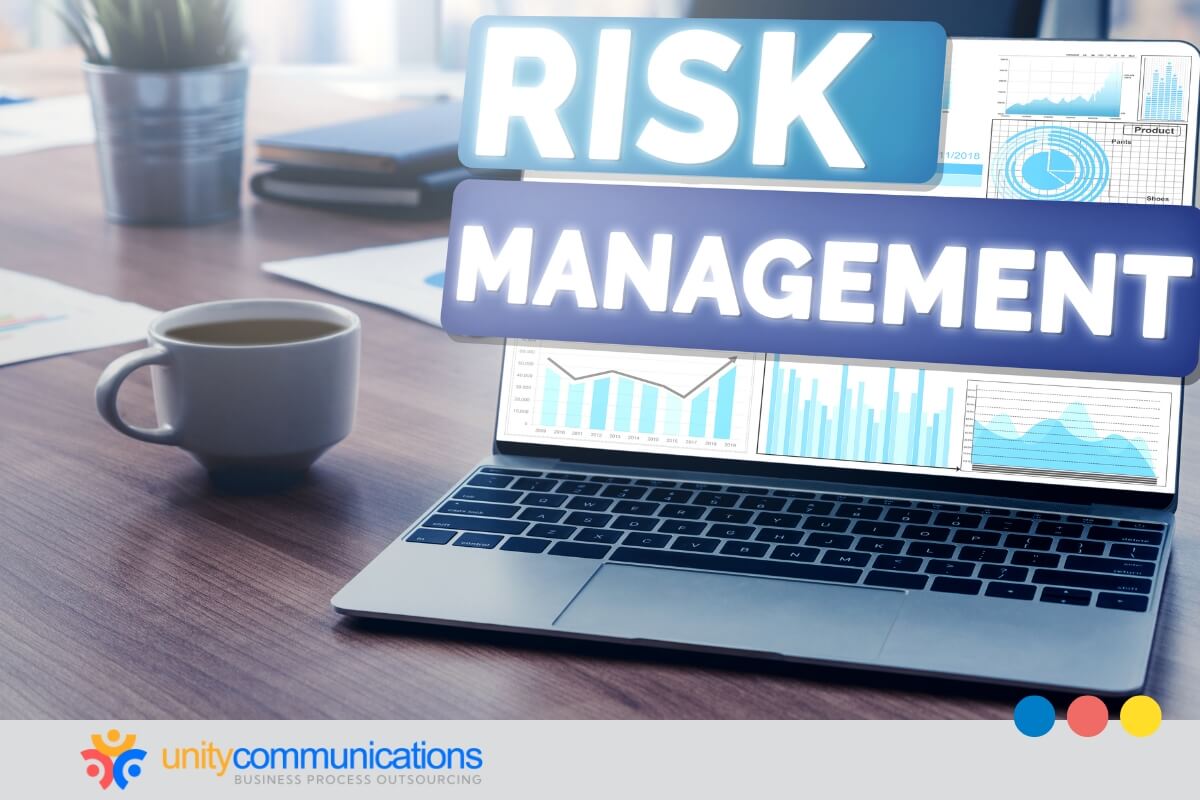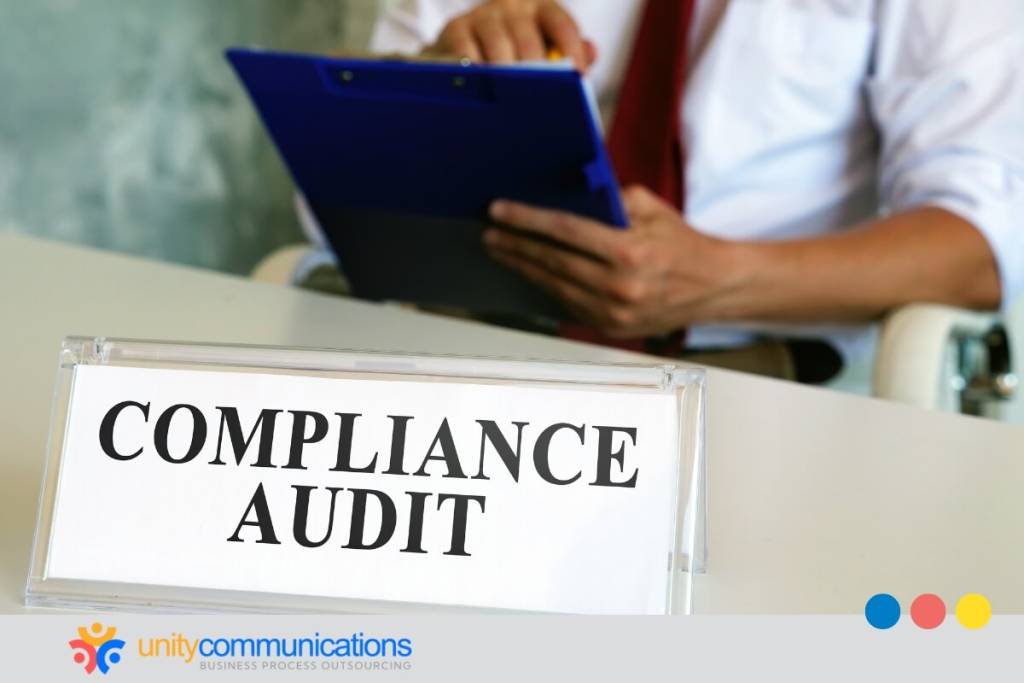Table of Contents
Real estate firms must comply with industry regulations to prevent costly disputes, legal issues, and reputational damage. However, agencies sometimes need assistance due to the complexity of these laws and the need for meticulous document management.
Business process outsourcing (BPO) provides these businesses with the specialized expertise and streamlined processes they require. Real estate BPO services practice accurate document management, thorough due diligence, and adherence to regulatory standards.
Keep reading to learn how leveraging real estate BPO for compliance checks can boost your efficiency while minimizing noncompliance risks.
Understanding compliance in real estate

Diverse legal, financial, and regulatory standards govern the real estate industry. Upholding them safeguards the business and the client, preventing disputes, financial losses, and potential penalties.
Regulatory compliance involves critical components that promote lawful, ethical, and financially sound real estate transactions. Examples include the following:
- Title and ownership verification: The process confirms the legal ownership of a property to determine whether the seller has the right to transfer the title.
- Disclosure obligations: These encourage the full disclosure of property defects and other relevant information to potential buyers.
- Financial compliance: Adhering to financial regulations includes accurate reporting of transaction values and compliance with anti-money laundering laws.
- Zoning and land-use regulations: These ensure the property complies with local zoning laws and land-use regulations.
- Contractual agreements: Real estate transactions include carefully drafted and reviewed contracts that meet legal standards and protect the interests of all parties.
Meeting these requirements can be time-consuming and resource-intensive. Hence, many real estate firms turn to outsourcing to speed up transactions.
Role of real estate BPO for compliance checks
What is BPO, and how does it help real estate agencies with regulatory compliance? BPO is a viable strategy that involves contracting third-party service providers to manage specific business functions. This way, companies can focus on their core competencies.
Real estate firms can become more efficient and productive by utilizing BPO for compliance checks. Outsourcing vendors have real estate experts who can easily navigate the industry’s complex legal, regulatory, and financial requirements and perform their tasks confidently.
This is how outsourcing works in real estate regulatory compliance:
- Document management: BPO firms handle the organization and storage of critical documents so that they are accurate and easily accessible for compliance checks.
- Due diligence: Outsourced experts thoroughly investigate property titles, ownership history, and potential legal issues.
- Regulatory monitoring: BPO services keep track of changing laws and regulations to keep real estate transactions compliant.
- Financial reporting: BPO providers help adhere to financial regulations and anti-money laundering laws through accurate and compliant financial documentation and reporting.
- Risk assessment: BPO companies evaluate potential compliance risks and provide recommendations to mitigate these risks effectively.
How BPO services enhance compliance

Legal, regulatory, and financial requirements governing the real estate industry vary across jurisdictions. BPO in real estate provides specialized knowledge, streamlined processes, and dedicated resources to help businesses overcome compliance challenges and improve their strategies.
Here’s how:
Documentation accuracy
BPO services employ specialized teams and virtual assistants (VAs) to perform accurate and up-to-date documentation. What is real estate VA? They are remote professionals who are well-versed in regulatory standards and industry best practices.
Real estate firms have many reasons to hire a real estate VA for document accuracy. VAs maintain the information’s accuracy and compliance by efficiently handling document preparation, verification, and management.
BPO companies also equip their real estate VAs with advanced technology to track and update documents in real time. With outsourcing, real estate firms can reduce the risks associated with outdated, incorrect, and undisclosed information.
Efficient risk management
Outsourcing helps real estate businesses manage compliance risks more effectively. BPO providers have dedicated teams that stay updated on the latest regulatory changes and industry standards to ensure timely adherence.
BPO firms also employ advanced risk assessment tools and methodologies to identify and assess compliance risks. They then provide real estate companies with insights to improve their mitigation strategies.
Regular audits and updates
BPO providers conduct regular compliance audits to ensure real estate transactions consistently comply with evolving regulations. These checks involve systematic reviews of documentation, processes, and practices to gauge their effectiveness.
BPO teams can interpret and promptly integrate new regulatory changes into compliance frameworks. They help real estate businesses adapt to regulatory updates swiftly, minimizing the risk of penalties.
Choosing a real estate BPO partner for compliance checks

Selecting the best provider is vital because the choice can significantly affect an organization’s operational efficiency and regulatory adherence. The right partner must have expertise in real estate regulations, a proven track record of accuracy, and the capability to adapt to evolving compliance requirements.
Vendor selection criteria
Below are the primary criteria to consider when selecting a BPO provider:
- Industry experience: Look for a BPO company with specific expertise in real estate compliance. This potential partner understands the industry’s nuances.
- Reputation and track record: Assess the provider’s reputation and track record for accuracy and reliability in compliance management.
- Compliance expertise: Ensure the BPO firm has a dedicated team with deep knowledge of current regulations and best practices in real estate compliance.
- Technology and security measures: Evaluate the BPO company’s technological capabilities and security protocols for safeguarding sensitive data and fostering compliance with data privacy laws.
- Flexibility and scalability: Choose a BPO partner that accommodates different compliance needs as the business grows.
One way to check a vendor’s reputation is through a real estate case study. It is a valuable learning tool that offers practical insights into successful strategies, challenges faced, and solutions implemented in real-world scenarios.
Importance of technology and experienced staff
BPO companies use advanced technologies to provide efficient document management, data analysis, and regulatory monitoring. These tools also guarantee accuracy and adherence to legal standards.
Meanwhile, experienced staff such as real estate VAs bring specialized knowledge and insights into regulatory requirements. They are thorough, diligent, and proactive in risk management, enhancing compliance capabilities and maintaining the integrity of operations.
Real estate firms must prioritize these aspects as they influence compliance.
The bottom line
Utilizing real estate BPO for compliance checks enhances operational efficiency and mitigates legal risks. BPO firms have specialized expertise in navigating complex regulatory landscapes and maintaining compliance despite evolving laws and standards.
Outsourcing allows real estate businesses to focus on core activities, reduce administrative burdens, and maintain a high standard of compliance, ultimately safeguarding their reputation and fostering sustainable growth.




